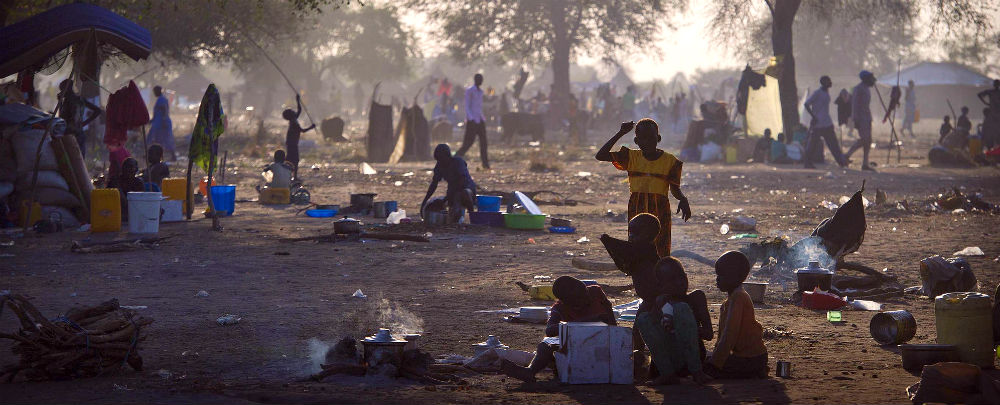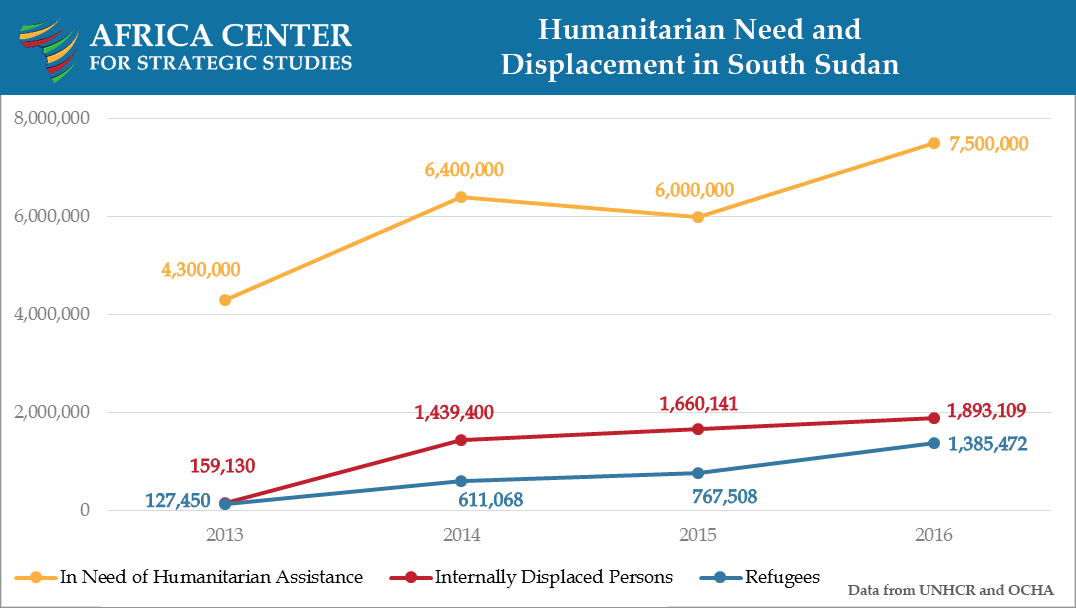
Refugees from Bor, South Sudan. Photo: Oxfam East Africa.
Systematic human rights violations including ethnically targeted violence, killings, torture, rape, displacement and the recruitment of child soldiers characterize the political violence unfolding in South Sudan, according to a recently released report by the United Nations Commission on Human Rights in South Sudan. This week, the Commission briefs the United Nations Human Rights Council, finding evidence of:
- Killings, torture, and inhuman and degrading treatment on the basis of ethnicity by government soldiers
- Hate speech and ethnically divisive rhetoric on social media by government leaders, including President Salva Kiir
- A 60-percent increase in the incidents of sexual or gender-based violence in 2016
- Large-scale recruitment of child soldiers
- Arbitrary arrest, detention, torture, and killings of journalists
- Censorship of critical media stories about the government
- Closure of newspapers
- Restrictions on and closures of human rights and humanitarian agencies
The Commission observed that these violations have manifested along ethnic lines and that a key feature is the targeting of non-Dinka ethnic groups by the National Security Service, Sudan People’s Liberation Army, and affiliate militia.
The Commission, which was created in March 2016, was mandated by resolution 31/20 of the Human Rights Council to monitor and report on human rights violations in South Sudan, to advise on transitional justice and accountability, and to engage with external actors with “a view to providing support to national, regional, and international efforts to promote accountability for human rights violations and abuses.”
The current conflict broke out on December 15, 2013, following a leadership struggle between President Salva Kiir, an ethnic Dinka, and then-Vice President Riek Machar, a Nuer. It is believed that the ensuing violence was planned. Since that time, an estimated 3.3 million people have been displaced by the conflict and 100,000 people have been killed.
The Commission recommended the creation of an investigative mechanism to investigate, collect, and preserve evidence on human rights violations and international crimes out of concern that “critical evidence is being lost every day as witnesses are killed or disappeared” and that “physical evidence degrades, and documentary and other similar evidence is lost, concealed, or destroyed.” According to the Commission, an investigative body is necessary partly because the hybrid court to be established by the African Union under the 2015 peace agreement is unlikely to be in place before 2019.
Any evidence that is collected would be made available to support trials before the hybrid court, as well as other international, regional, and national courts that could assert jurisdiction.
The Commission’s report is the first by an international organization on the human rights situation in South Sudan since March 2015. Previous reports, which also found that serious crimes had been committed, include:
- Report of the Assessment Mission of the Office of the High Commissioner on Human Rights, March 10, 2016
- Report of the African Union Commission of Inquiry on South Sudan, October 27, 2015
- Conflict in South Sudan: A Human Rights Report of the United Nations Mission in South Sudan, May 2014
The Commission reiterated claims the government is mounting a campaign of ethnic cleansing. This has been effected by creating new states that maximize Dinka influence, burning villages, conducting hate speech, and bombarding civilians. The Commission notes that the government’s scorched-earth policies against target communities “result in the destruction of their homes and means of livelihood.” According to the Commission, the humanitarian situation is, as a result, dire and that “diseases, protracted instability, the escalation of the conflict, and widespread destruction have combined to generate unprecedented levels of hunger.”
On February 20, the United Nations officially declared that 100,000 people are in a state of famine, and that a million more are on the brink of starvation. The Commission’s report echoes conclusions by other organizations, including the Africa Center for Strategic Studies, that the disaster in South Sudan is a man-made result of the conflict.
In addition to establishing an investigative mechanism, the Commission made a series of recommendations to the government of South Sudan, non-state armed groups, as well as the United Nations and the African Union. These include:
- Ceasing attacks on civilians
- Ending the clampdown on the media
- Creating a conducive environment for the return of refugees
- Allowing unfettered access to the UN, humanitarian workers, and human rights groups
- Fully implementing the 2015 peace agreement and in particular, the creation of a Truth Commission and Reparations Fund
- Taking necessary measures jointly with the African Union to establish the hybrid court
Africa Center Experts
- Kate Almquist Knopf, Director
Additional Resources
- Kate Almquist Knopf, “Ending South Sudan’s Civil War,” Council on Foreign Relations, November 28, 2016.
- UN Commission on Human Rights, “Statement to the 26th Special Session of the Human Rights Council,” December 14, 2016.
- Kate Almquist Knopf, “Fragility and State-Society Relations in South Sudan,” Africa Center for Strategic Studies Research Paper No. 4, September 30, 2013.
- Kate Almquist Knopf, “South Sudan: Options in Crisis,” Congressional Testimony, September 21, 2016.
- Paul Nantulya, “Getting to the Root of the South Sudan Crisis,” Africa Center for Strategic Studies Spotlight, August 1, 2016.
More on: Conflict Prevention or Mitigation Identity Conflict Stabilization of Fragile States South Sudan


